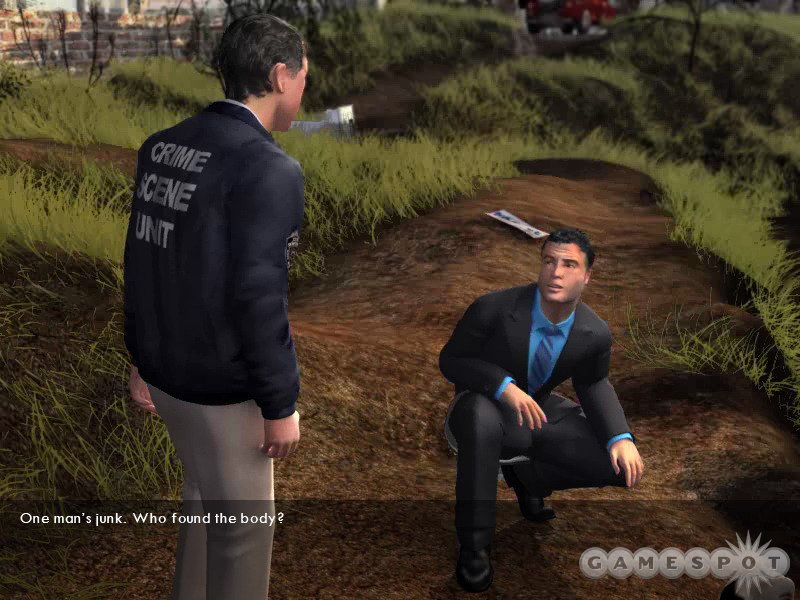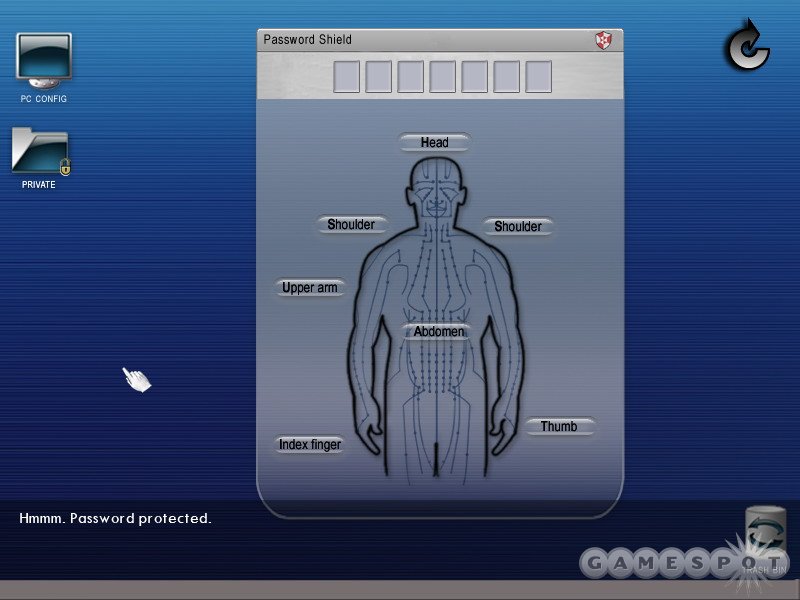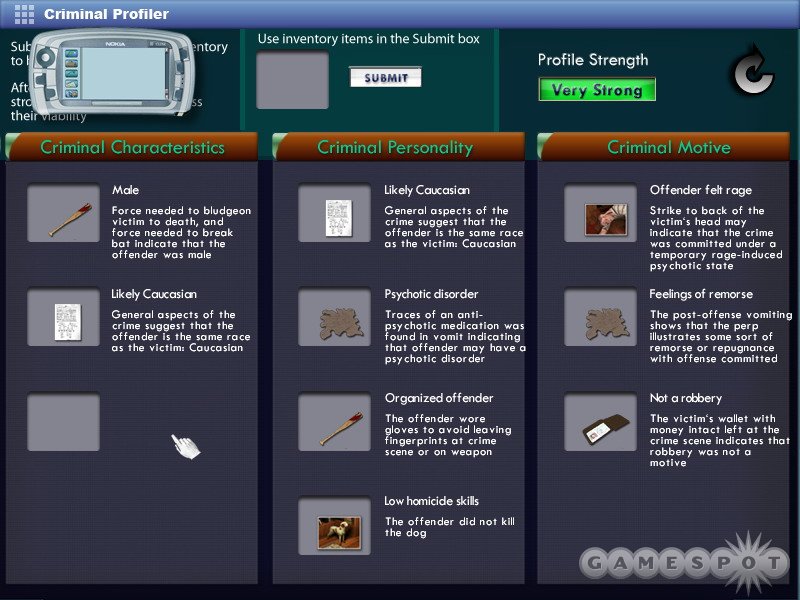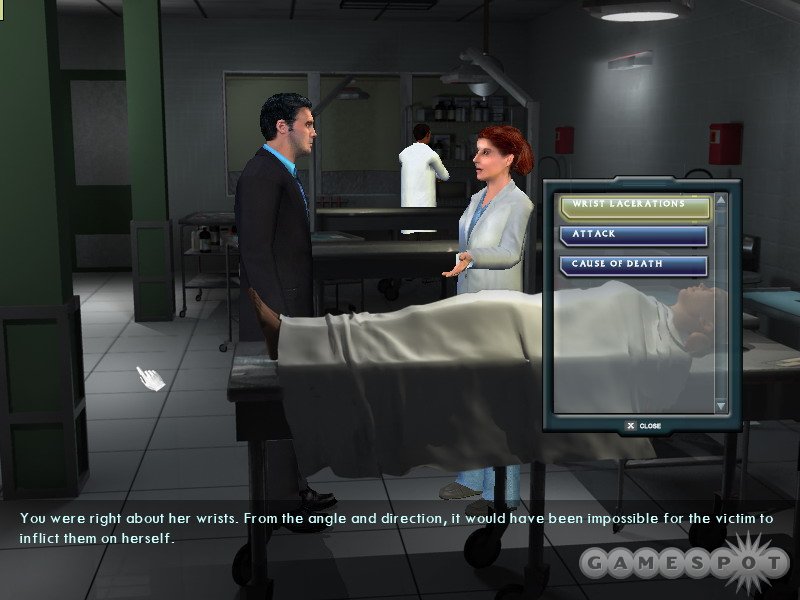Among fans of Dick Wolf's Law & Order television empire, the hierarchy of shows goes something like this: Law & Order, Law & Order: Special Victims Unit, then Law & Order: Criminal Intent (and the less said about Law & Order: Trial By Jury, the better). Legacy Interactive has already churned out a number of PC adventure games based on the original series, the last two actually being thoroughly competent games despite being largely targeted at the most casual of audiences. For its latest Law & Order game, Legacy opted to skip the obvious choice of creating a Special Victims Unit game, and went straight to Criminal Intent. OK, that's fine. After all, the show's more psychological nature could have easily lent itself to a more intriguing brand of investigation. However, any notion of that goes flying out the window mere minutes into any of Law & Order: Criminal Intent's assorted murder cases. The clunky interface, leaden pacing, mostly ugly visuals, and host of irritating and detrimental bugs pretty much squash whatever potential this game might have had, and set the Law & Order game franchise back about three years.

Criminal Intent does offer quite a bit more content than any of the previous games. With the whole jury trial aspect of the game shirked (it's altogether absent in the TV series, too), you are instead treated to three available murder cases from the get-go, with a fourth that opens up after the other three are solved. Each case follows the usual brands of twists and turns you'd expect, with a few different suspects with equal amounts of motive, plenty of obscure clues, and periodic puzzles that need solving. The puzzles are actually more abundant in Criminal Intent than ever before, and many of them are legitimately challenging--though they also seem just a bit out of place. It's one thing to spend some time reassembling a torn-up piece of paper that could yield a clue; it's quite another to hack someone's computer password using a model of a human body and trying to figure out the right order of selectable parts. When was the last time you saw Vincent D'Onofrio do that on TV?
The oddball puzzles are forgivable because they do add some real challenge to the proceedings. Few other things about Criminal Intent get such a pass. One of the biggest overall changes to the formula is the new third-person cinematic perspective. You no longer view the game from the first-person. You see D'Onofrio's Detective Bobby Goren character, and by pointing and clicking the mouse, Goren will walk to wherever you tell him to...eventually. Goren isn't exactly spry, so he tends to take an overly long time getting from place to place--a fact made all the more obnoxious by the copious amount of backtracking and wandering you'll end up doing throughout the game. Every time you travel to a location, you always start out in a neutral spot that's typically bereft of useful clues or objects. If you end up going back to that location later to find an obscure piece of evidence, you'll have to start back at that spot, and spend the time making Goren walk back up the stairs, or down a long hallway, or whatever it takes. Realistic, sure, but it kills the pace of the game and makes repeat trips an irritating chore. And this is all assuming that Goren will actually walk where you tell him to, walk to a spot that doesn't block your cursor from selecting a piece of evidence, or will not get stuck walking in one place, forcing you to reboot the game. And that's not a safe assumption.

That's only the tip of the iceberg when it comes to the bugs in this game. Animations will frequently hang, glitch, and periodically cause characters to just disappear. The game also has an unbecoming habit of crashing at random intervals. Click on the wrong piece of evidence at the wrong time, and it's right back to the desktop with you. If for any reason another window pops up and minimizes the game, it crashes every single time. So, as you can imagine, it's a good idea to save as much as possible--a fact made much more infuriating by the lousy save system.
Every time you want to save, you have to bring up your PDA menu, click on the bottom icon that takes you out to the main menu, select "save game," and then create a new save every time. You can't overwrite old saves, even if you name them the same thing. So by the time you've spent the eight or nine hours necessary to beat the game, you'll have a metric ton of game saves floating around, all because you can't trust the game to go more than half an hour without crashing in one spot or another.
There are also a lot of things that just feel kind of half-baked and sloppy in Criminal Intent, mainly with the interface. The cursor icon you use to identify hotspots in the environments looks nearly identical to the neutral cursor, so you kind of have to squint any time you think you might have something in your sights. When you're using your PDA, sometimes the enlarged window will get stuck and won't minimize when you tell it to, either because it just stops responding or because the cursor switches to a hotspot cursor and won't change back to let you click the window away. And when you're collecting evidence, you have the option to send it to be analyzed. In past games, you could specify whether you wanted it sent to the lab, the research department, or both. Now it only lets you choose both, so you end up with lab reports on documents, and research reports on a sample of vomit. Lovely.

For everything that's generally broken in Criminal Intent, there are at least a few things that are actually enjoyable. The assorted mysteries themselves are fairly intriguing, with some solid twists and surprises--just don't ever click that green arrow in the upper right-hand corner of your location map, because that will inexplicably display every location you'll eventually travel to during that case, and spoil a lot of the surprise. As you go, you'll get to use a couple of cool investigation techniques, outside of the usual pixel hunting and evidence collecting. When you're talking to a suspect or a witness, you're given a variety of conversational tones to use. Goren's character on the show is a master at using psychology to get confessions, so this plays to the character's strengths. Sometimes you'll need to be intentionally deceptive to get them to talk, and other times you'll want to play it sympathetic, or aggressive. Of course, there's only ever one specific conversational choice that nets you the right answer, and if you repeatedly choose the wrong ones, the person you're talking to will just clam up. But then, all you need to do to get them to talk to you again is just leave the area and come back again. If only it were so easy in real life.
You can also help dig up a suspect using a criminal-profiler tool. Just take any piece of evidence that seems relevant to the case and insert it into the profiler. If the tool deems it relevant, it will analyze that evidence and give some insight into the characteristics of the suspect, like race, gender, personality, and that sort of thing. When you have all the evidence inserted, you can start throwing suspects at it, and it'll tell you how likely or unlikely it is that that person committed the crime. After you have a solid suspect, you can apply for search and arrest warrants. This is all a great idea, especially since the old games had rather opaque terms for getting warrants. The one problem, though, is that sometimes you'll get pretty much all the important characteristics fairly early in the case. So when the tool's telling you that a male did the crime, and you're still tracking down a female suspect, it kind of renders those portions of the story just a bit dull, since you already know they probably didn't do it.

In its presentation, Criminal Intent is kind of all over the place. The environments are fairly well crafted, with plenty of little, subtle details all over the place, and proper aesthetics for the atmospheres they're trying to create. The people who occupy those environments, however, are flat-out ugly. Goren shows the most detail of any of the bunch, but even he looks blocky and gross. Every character model is extremely aliased, with jagged lines clearly separating them from the background environments. And then there are the ultra-broken animations, which include no transitional animations of any kind, frequent glitches, and purely stilted movements. The audio is a little bit better, fortunately. Both Vincent D'Onofrio and Jamey Sheridan reprise their roles from the show. Sheridan's altogether decent, but D'Onofrio dead-reads his way through the entire script. He tries to do his off-kilter inflections for the character, but it's all so flat and boring that he might as well have not even shown up. Thankfully, the supporting actors pick up some of the slack, and the game does have a decent, if generic, soundtrack.
Law & Order: Criminal Intent seemingly has its heart in the right place, but the onslaught of technical gaffes, ill-conceived mechanics, and lazy interfaces pretty much put a knife through that heart. Every piece of Criminal Intent feels severely rushed and bereft of care. It's really too bad, as Legacy had built up some solid momentum with the last two Law & Order games. Now it'll be back to the drawing board, it seems.